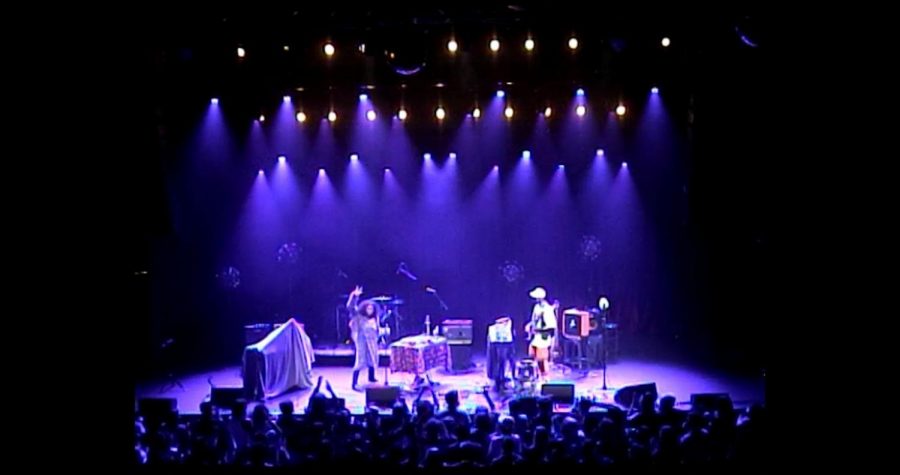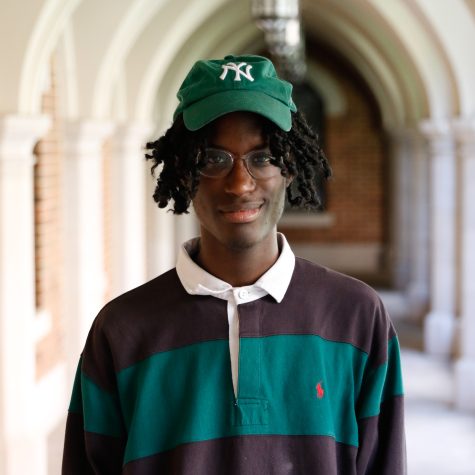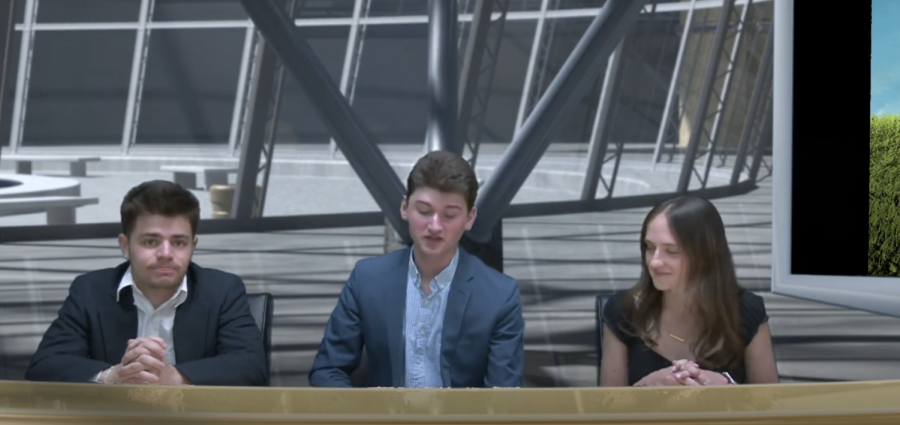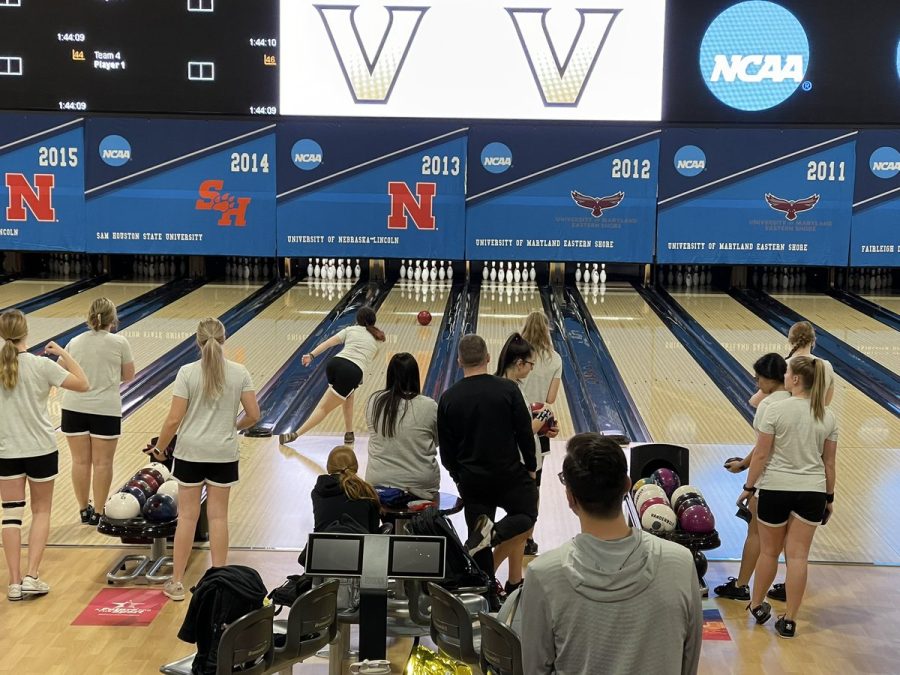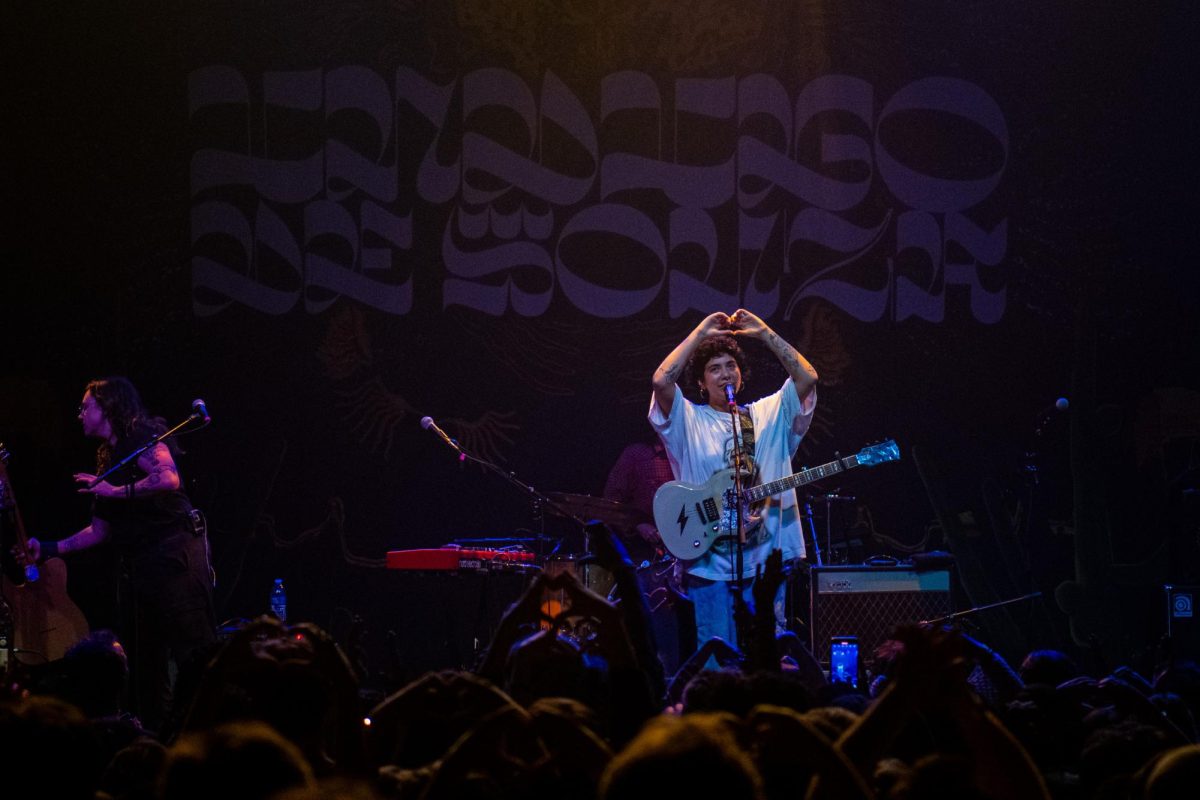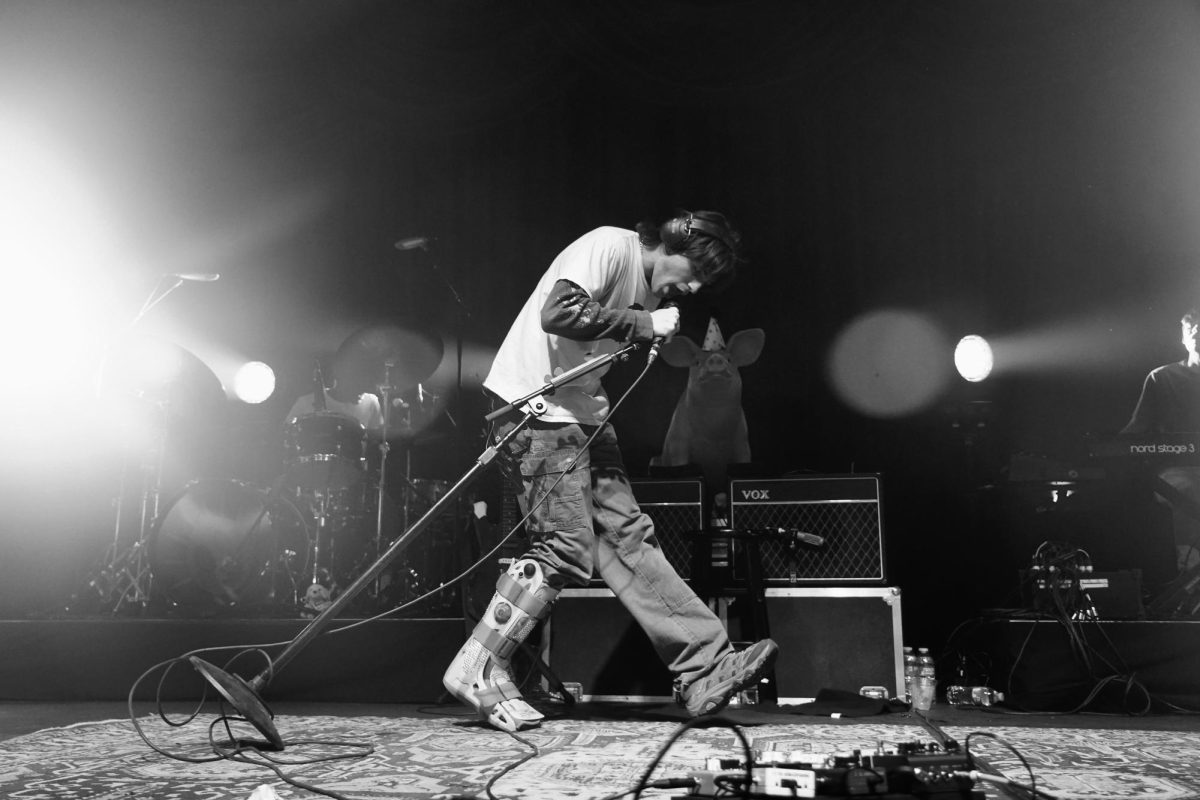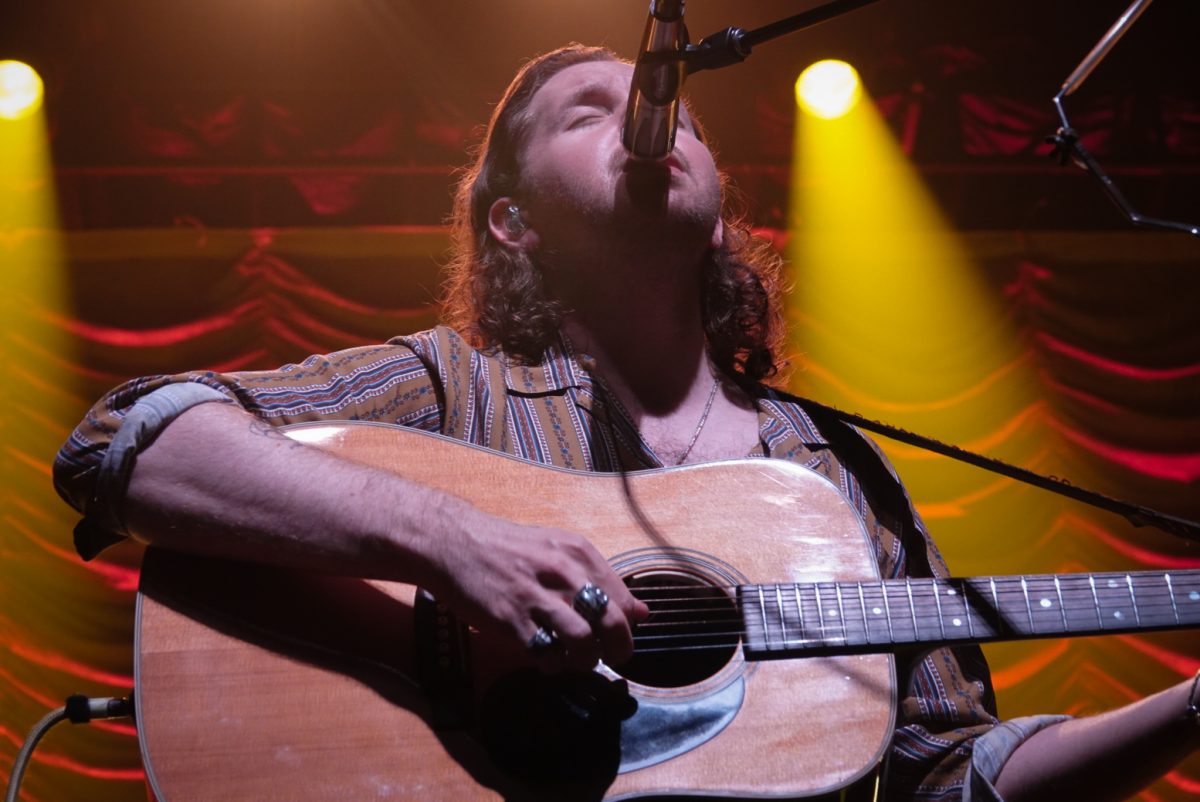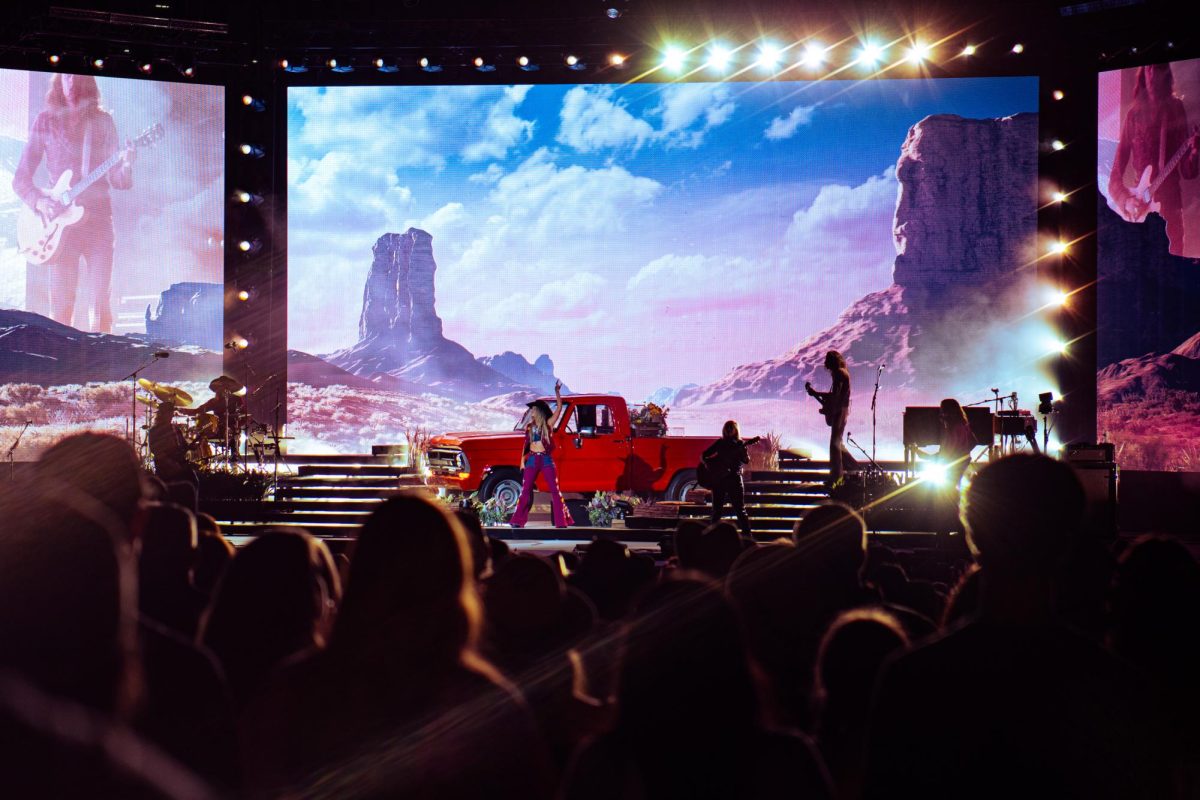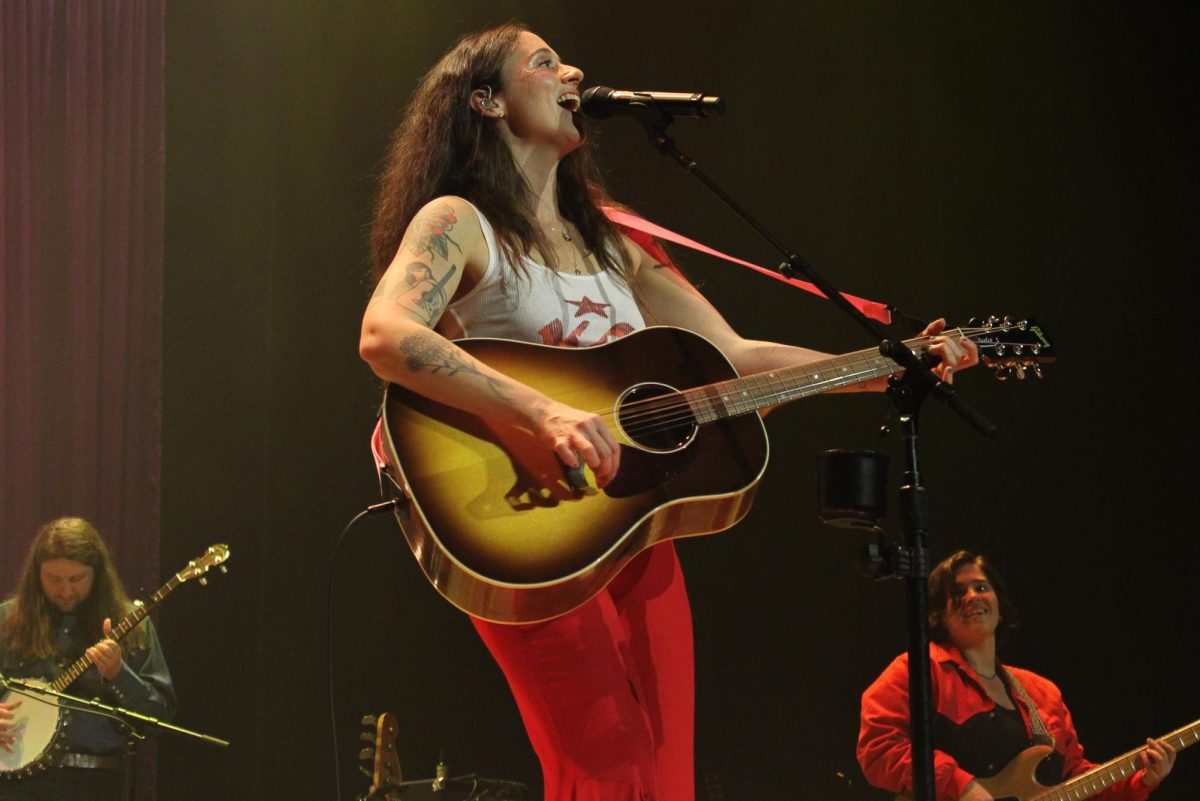When, about an hour before doors opened on Monday, I realized that (1) I didn’t have enough in my bank account for an Uber to the Brooklyn Bowl and (2) the walk there would be an hour and 10 minutes, my decision came without hesitation: I got up, tossed a bottle of water into my drawstring bag and started walking.
I don’t do things like this for every artist. I am in a perpetual state of being behind on assignments. As I threw on my light jacket, on my desk sat intimidating stacks of readings I had to catch up on, essay prompts I had to address sooner rather than later and my laptop, opened to a Brightspace page I was far too terrified to check. I was notified that I had gotten onto the press list to see Crumb and duendita a matter of hours before the show started. And somehow, as soon as I got the text, the homework seemed to wipe itself clean off my agenda.
There’s an album by Pharrell Williams’ band N.E.R.D called “Seeing Sounds.” This is uncannily applicable to the music put out by Crumb and duendita alike: each make music that you can see—taking unconventional approaches to cathartic extremes, with the effect that such boundary-breakage crosses over into the sensory realm.
Last time I spoke with Crumb, they detailed to me that in recording their latest album “Ice Melt,” they put condoms on their microphones to achieve underwater-esque sonic effects. In duendita’s case, too, last time we talked, she was hyped to show me a woolen case she had literally taken the time to hand-craft for one of several intricate musical gadgets in her rotation.
When you hear Crumb rip through the eclectic soundscapes of “Ice Melt,” you have no choice but to see the sounds on top of hearing them; they may appear in vibrant swirls of color, daydreams about your crush (dear past Samuel: she doesn’t want you) or doomsdays in which robotic humanoids take over the world. IIn “bio,” duendita croons existential calls to action over a sweeping electric bass riff, and you can see movement, freedom and release; they flash before your eyes like snippets of a utopia only reachable by the releasing of inhibitions.
On this particular evening, I was on my way to “see sounds” in a far more literal sense. When I arrived at the Brooklyn Bowl after an hour of persistent betrayal at the hands of Google Maps—no one should have to be stranded in the middle of the highway at 7:30 p.m. on a Monday—the sun had just gone down, and I was met with a haphazard line of snazzily-dressed teenagers. As I scrambled to get my state ID out of my wallet, one shaggy-haired student squashed a cigarette into the sidewalk with a dirty pair of Converse All-Stars, while another small group of them sheepishly had black X-marks drawn onto their hands after trying to discreetly construct a ruse for getting drinks.
The Brooklyn Bowl is built a lot like the set of a low-budget action movie that couldn’t afford more than two shooting locations—before you get to the main stage area, you find yourself walking past a few obscure rooms, a bar and an entire bowling alley. When I made it down the long hallway, which ever-so-slightly made me feel like I was on my way to the electric chair, I was greeted with even more snazzily-dressed teenagers—along with a smattering of giddy adults—who were loosely huddled up as close to the stage as the barricades would allow.
Whereas most artists who attract teens with dirty Converse tend to have more niche audiences, Crumb and duendita make music wide-ranging enough to attract an equally wide fanbase. Local college first-years were by far not the only demographic represented. For the majority of the show, I was next to a husband and wife who kissed just about every time a romantic lyric was uttered.
Because I had just been told by friends, in detail, about gruesome mosh-pit injuries sustained at the Playboi Carti concert, I was intent on keeping my distance from the front. As fans trickled in and I established my place about two rows from the stage, I struck up a conversation with Jackson Lord, a student who had just moved to Nashville from Connecticut.
“With Crumb, they had some pretty hot singles that came out pretty early on,” Lord said. “I think they came up on my Spotify Recommended, and I kept listening.”
His discovery process was just as unplanned in duendita’s case.
“Do you know the collective ‘Standing on the Corner?’” Lord asked me, referring to the New York-based group whose genreless streams of consciousness have landed them on the radars of Solange Knowles and Earl Sweatshirt. “I don’t know how I figured out about one of their albums, but apparently she did some work with them. They have that whole collective going on, so I just kind of followed that and eventually found her, and she had some pretty banging stuff.”
Crumb and duendita both aren’t as intent on tryhard chart-climbing as community, so one isn’t likely to discover them via the college basketball team’s PA system—in my case, I first heard duendita on a MIKE track she contributed vocals to, and initially found out about Crumb because a friend was doing art direction for their latest LP—but once the connection is made, the musical wormhole you wind up getting sucked into is impossible to escape. This was the exact feeling when, at some point in Lord and I’s conversation, we were plunged into darkness, and duendita approached a pair of synthesizers on stage.
She hoisted a ceramic horse that sounded like an enchanted wind-up toy, smiling up at bassist Noah Becker as the pair fiddled with eerie noises sourced from the gadgets stationed before them; the sounds emanated in loud echoes from the hunched figures, oscillating from ear to ear, person to person. This continued on for several minutes. The lights on stage were all green, and I was beginning to feel like the alien takeovers I visualize when listening to Crumb and duendita through headphones were getting ready to come true.
The essence of duendita’s capacity for performance is perfectly captured by the fact that, for the entire hour or so that she was on stage, she only played one official track. (In case you’re wondering, it was “bio.” No disclaimer was issued for the effects of such violent bass guitar vibrations on my body, but at this point, I am too mesmerized—and behind on my homework—to press charges).
At one point between songs, when a fan on the balcony screamed out a request for her 2014 single “One of One” for the umpteenth time, she took the microphone, glanced up towards him, and said, “My love: ‘One of One’ is not happening tonight.”
Where most artists would have left it at that and jumped into the next thing on the setlist, she offered to sing it to him personally when the show ended. The audience roared when she squinted her eyes through mighty high notes; they yelled in affirmation when she asked whether anyone out there was “healing the pain,” too; the husband next to me seemed to scream “hit ‘em with it” every time Becker unleashed another ruthless bass solo.
By the time duendita asked, “Are you ready for Crumb?” near the end of her set, we were all sweating, the floor was sticky with spilled beer and there wasn’t an unentertained reveler in sight. Whatever alien entity visited at some point definitely took my homework with it. I could see the email in my head: Dear Professor—due to unforeseen circumstances, I was not able to do the reading for Tuesday’s discussion. As you know, the COVID era has changed so much, and as a first-year student…
No more than an hour passed, and Lord and I were once again plunged into darkness, the members of Crumb emerging from backstage and acknowledging shrieking fans while picking up their instruments. Looking at the band throughout what I saw of their performance, I quickly learned that it is one thing to hear Crumb’s music through cheap overhead headphones, and another to witness each member, individually, as they produce the sounds live.
At the end of a “Balloon,” following a jazzy, synth-infused musical break, I watched bassist Jesse Brotter squint his eyes, jumping manically back and forth as he belted out ultra-distorted thumps. During the denouement of “Trophy,” when multi-instrumentalist Bri Aronow rose from her keyboard to unleash a heart-wrenching, guttural saxophone solo, I watched her tilt her head upward, swaying back and forth as the instrument seemed to press a collectively-needed pause button on the outside world. Sometime near the end of “Fall Down,” after fumbling with her guitar strap seconds before a solo, singer-guitarist Lila Ramani hurriedly crouched low, propping the guitar on her knee while its howls commanded those of the audience. There were several instances, too, where drummer Jonathan Gilad met eyes with Brotter, and after a brief exchange of words and head-nods, locked into a pocket with the sort of stank face pervasive music is known to conjure. Crumb is making music for music’s sake, and I know for two reasons: (1) By night’s end, my face was sore from being scrunched for so long, and (2) my homework remained completely unfinished … without a single regret.
Somewhere in the middle of Crumb’s set, duendita found me in the audience and invited me to bowl. Nestled in the farmost lane of the venue’s dimly-lit alley were her filmographer Godfred Sedano, her manager Sandy Ismail, Becker and the group’s driver, who goes by T-Rex. Ramani and Aronow joined in at the conclusion of their set, with the addition of Abraham El Makawy, who managed art direction for “Ice Melt” and was celebrating his birthday.
“I feel like I wrote that part at a pretty dark time,” Aronow said of her jarring saxophone solo. “And it’s me practically crying into it. Screaming.”
Music as a means of vital expression is a constant theme across the board for both acts, and as much as the bunch come off as eternal youths using life as a playground—literally as Aronow said this, our conversation was briefly interrupted by the collective scream that resulted from T. Rex rolling a strike (and duendita doing hilarious celebratory dances)—the art they produce is deeply personal. Each track is a sacred confession, shared with audiences who are trusted not only to consume it, but give it new life.
“I just have to make space to let things flow through me,” duendita said, as a blasting dream-pop song soundtracked the steady departure of fans from the open floor. “My music soothes me. It’s relentless, I can’t help it. It’s nice to write a song and be like ‘Oh, I was going through that?’ Sometimes it’s hard for humans to process their emotions—music helps me do that. Like ‘Damn, that’s how I felt?’ It’s just a funny record of how I feel.”
As Ismail gave me a very tough act to follow on the bowling lane, I asked duendita how it felt when she saw hundreds—sometimes thousands—of strangers resonating with her sonic diary.
“I don’t know what’s happening,” she said, continuing to speak into my phone while I rolled two consecutive gutterballs.
It’s a crystal-clear genuinity that transcends the capacity of each act as an artist and further epitomizes their outlook as human beings. It is easy to look at moments like Ramani’s transcendent kneeling guitar solo or duendita’s cathartic, crowd-stirring high notes and begin to see the characters on stage as people who have everything figured out—but what happens once the shows end is the same thing that happens for the rest of us … life. And in a world where absolutely nobody has the answers, all we can do—whether we’re stank-facing on the stage or hollering song requests from the balcony—is live.
Upon my return from rolling yet another gutterball (I came in last place), T-Rex told me to sit down for a second.
“So tomorrow,” T-Rex said of the group’s one rest day before heading to Alabama, “all we’re going to do is hike.”
“Hike?”
“And look at birds.”
“And look at birds?”
“Yes. On purpose. Because we like coming in, and going out. We just have bonfires, and marshmallows, and hot dogs, and hikes. We love sovereignty, we love individuality and we love collaborative creativity. And you only get that from taking time to experience.”
When our bowling game was over, and I approached Becker to ask him how he got his bass to sound like that, I followed up by asking him on a whim whether he had anything wise to say to The Hustler.
“Take care of your friends and your family,” Becker said. “Make beats. And don’t do drugs.”
I must add one more thing to Becker’s list: please make sure you do your homework after the concert.











